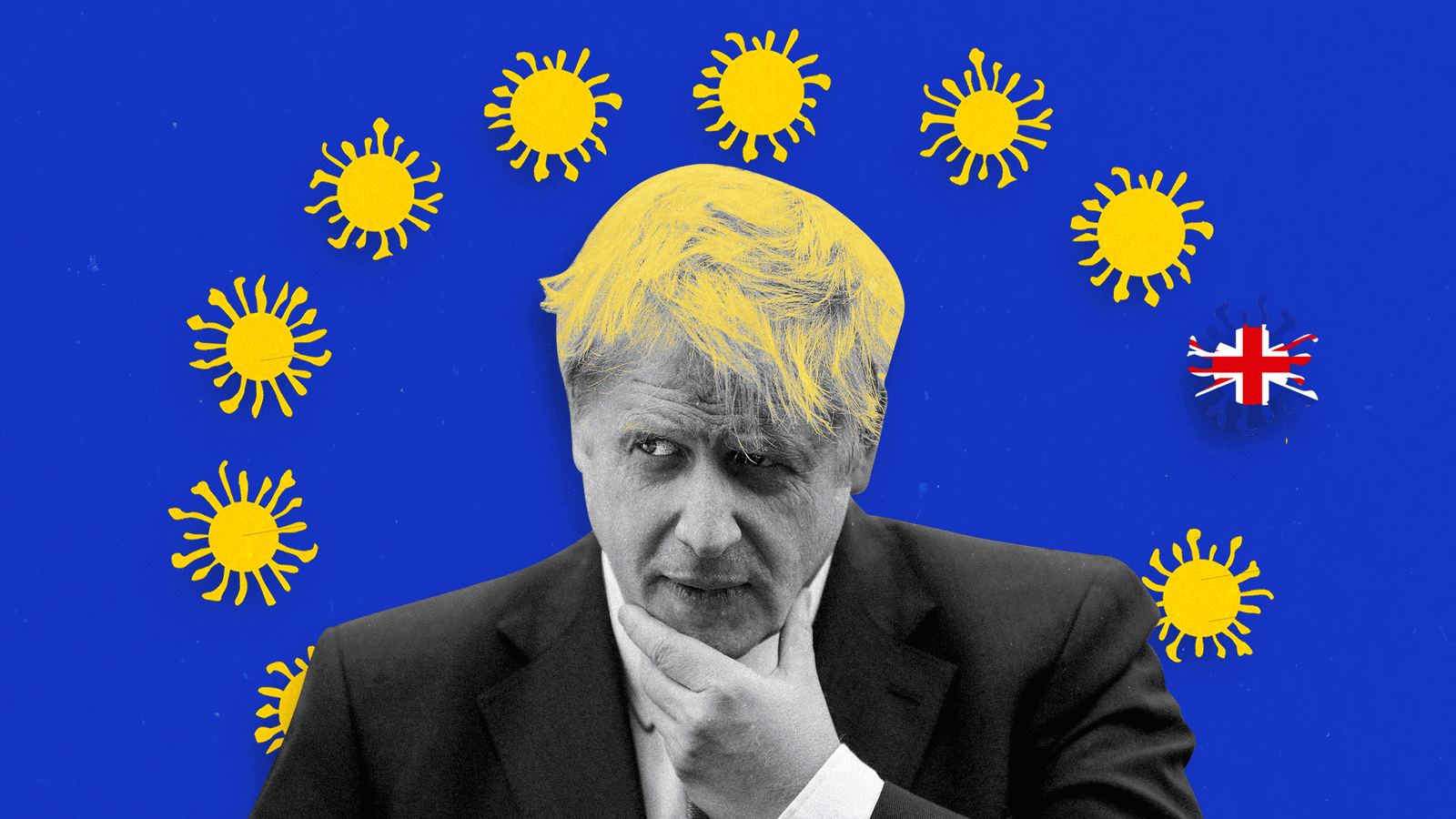MANCHESTER, England—Britain is, you may have noticed, not doing tremendously well at the moment. England is recording around 40,000 new COVID-19 cases every day—a rate much higher than all its European neighbors—supermarket shelves)" href="https://urldefense.com/v3/__https://www.mirror.co.uk/news/uk-news/empty-shelves-across-uk-amid-25180813__;!!LsXw!Ekr7Mi0XBM1Od43SzxmuSMt7PboPM2Tka9VG5meUPMeGn643i2Ry2zH7hb8sF43tCK7yEA$">supermarket shelves are emptier than they are elsewhere, and for a few weeks, there was no fuel to be found in the south of the country. British voters were promised sunlit uplands when they voted for Brexit and, instead, they are getting raw sewage)" href="https://urldefense.com/v3/__https://www.mirror.co.uk/news/uk-news/sewage-shames-revealed-uk-pours-25298442__;!!LsXw!Ekr7Mi0XBM1Od43SzxmuSMt7PboPM2Tka9VG5meUPMeGn643i2Ry2zH7hb8sF43usCpupQ$">raw sewage dumped directly into their rivers.
In this context, the Conservative party conference, which took place last month, felt especially odd. The government and its lawmakers and advisers gathered in Manchester and, to put it simply, had a lovely time. The champagne was flowing at drinks receptions and the politicians were, more than anything, just happy to spend time together after 18 months of isolation.
“The general mood is pretty buoyant,” said one former Conservative adviser who worked in Downing Street. “People are pretty happy, and pretty confident with the way that things are going.” But how?
Well, there is an easy—if puzzling—answer: They are doing very well in the polls. On Oct. 21, YouGov reported)" href="https://urldefense.com/v3/__https://yougov.co.uk/topics/politics/articles-reports/2021/09/17/voting-intention-con-39-lab-35-15-16-sep__;!!LsXw!Ekr7Mi0XBM1Od43SzxmuSMt7PboPM2Tka9VG5meUPMeGn643i2Ry2zH7hb8sF40JP1kmNg$"> reported that 37 percent of people would vote for the Conservative party if there were a general election tomorrow, compared with 33 percent for Labour. The figures were 39 percent and 35 percent in September and 38 percent and 34 percent in August. Whatever the Conservative party is selling, the voters are buying.
It is quite a baffling state of affairs but, according to Will Jennings, a professor of political science and public policy at the University of Southampton, it shouldn’t be surprising. “Two words: COVID and Brexit. The Conservatives are committed to getting Brexit done and that still defines our political landscape, even though they have some doubts about what’s going on.”
Jennings added: “With COVID, ultimately people are willing to give the government a lot of latitude for how it’s gone. Despite the fact that in elite circles, there’s a lot of criticism about specific responses, and the government always seems to get dragged kicking and screaming into making interventions quite late, voters don’t have quite the same experience… There are lots of specific things that one can identify that have not gone so well with Brexit and COVID, but citizens are actually remarkably forgiving.”
Jennings has a point. Though Brexit hasn’t gone especially smoothly, the negative effects it has had on life in Britain—from supply chains to trade disputes—have either been happening far away from the day-to-day life of most people, or been rolled into the side effects of the pandemic.
Similarly, the government’s handling of COVID-19 has been less than ideal—the country has suffered from considerably more deaths than others on the continent—but the early and effective rollout of the vaccine has done electoral wonders.
This has been a nightmare for the opposition. Keir Starmer was elected as the leader of the Labour party last spring, and is yet to make his mark on British politics. “In times of crisis, often what you have is people saying, ‘We need to pull together. The government has a tough job,’” Jennings explained. “They will have their own criticisms, but they don’t want a pure flow of negativity. That’s why it’s actually incredibly difficult for the opposition to define itself in a period where things are not going great.”
It must be especially frustrating for Labour as, in isolation, the Conservatives are not doing brilliantly. When polled by DeltaPoll in mid October, 43 percent of people said they thought Johnson was doing well in his job and 52 percent thought he was doing badly, giving the prime minister a net approval rating of -9. In short: The government isn’t that popular, it is just the most popular of the options available.
Does this mean Starmer is doomed? It depends who you ask. An increasingly divisive figure among activists, the leader has been criticized for spending more time fighting the left of his own party than anyone else. His election as Labour’s figurehead was also an interesting bet: Measured and occasionally verging on the dull—Starmer is everything Johnson isn’t. Will that entice voters once they get bored of the Boris act? Maybe, maybe not.
In any case, change may finally be on its way. “We’re now entering the stage where COVID is going to become less important,” explained Joe Twyman, who runs DeltaPoll. “Moving forward over the next weeks, months and years, what’s going to become more important is all the things that used to matter—immigration, education, taxation, the economy, and so on. We’re transitioning into a new stage, and the situation could change again quite easily.”
Between energy bills rising and inflation remaining a very present threat, the country may well be headed towards a dire cost of living crisis, which would mark the end of the government’s extended honeymoon. Or maybe it will be something else—half the fun of politics is not being able to predict what will end up mattering.
Journalist Charlotte Ivers made that point)" href="https://urldefense.com/v3/__https://www.thetimes.co.uk/article/another-drop-of-scandal-and-boris-johnson-will-be-in-danger-of-being-washed-away-jh8blw6jb__;!!LsXw!Ekr7Mi0XBM1Od43SzxmuSMt7PboPM2Tka9VG5meUPMeGn643i2Ry2zH7hb8sF413_HS80g$">made that point in The Sunday Times a few months ago. As she put it, “Political poison does not always build up step by step. Rather, it bubbles unnoticed under the surface, waiting for a tipping point at which everything boils over and comes together.” Nothing matters until one thing matters, then everything does.
The Conservatives do not seem especially worried about this at the moment, either in private or in public. Perhaps they are right not to fret. The country may not be doing great, but parliamentary arithmetic remains on their side.
As Jennings explained, “They have assembled this Brexit coalition which is still sticking with them, whereas the opposition is really fragmented across the Greens, the Liberal Democrats, Labour, and the Scottish National Party. That’s a defining feature of British politics now—the right and the Brexit side of politics is unified, and the liberal left is fragmented.”
Rome may be burning, but if you were Boris Johnson, wouldn’t you be fiddling as well?








